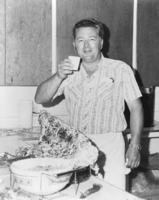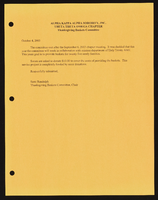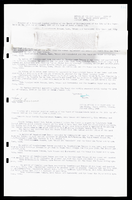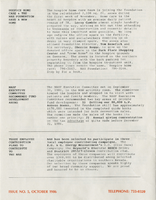Search the Special Collections and Archives Portal
Search Results

Bob Ruud wrapping meat for the Pahrump Harvest Festival: photographic print
Date
Archival Collection
Description
From the Nye County, Nevada Photograph Collection (PH-00221) -- Series IV. Pahrump, Nevada -- Subseries IV.B. Ruud Family. Bob was the chef for the festival for about 12 years.
Image

Alpha Kappa Alpha Sorority, Theta Theta Omega Chapter Thanksgiving baskets committee report
Date
Archival Collection
Description
From the Alpha Kappa Alpha Sorority, Incorporated, Theta Theta Omega Chapter Records (MS-01014) -- Chapter records file.
Text

Robert Kim oral history interview: transcript
Date
Archival Collection
Description
Oral history interview with Robert Kim conducted by Kristel Peralta, Cecilia Winchell, Ayrton Yamaguchi, and Vanessa Concepcion on March 05, 2021 for the Reflections: The Las Vegas Asian American and Pacific Islander Oral History Project. In this interview, Kim describes his career in law. He talks about his Korean roots, the model minority myth, and experiencing racial discrimination. Lastly, Kim discusses the Las Vegas Asian American and Pacific Islander (AAPI) community, his involvement with the Asian Bar Association of Las Vegas, and the importance of electing Asian Americans into political positions.
Text

Nancy Brune oral history interview: transcript
Date
Archival Collection
Description
Oral history interview with Nancy Brune conducted by Monserrath Hernandez and Rodrigo Vazquez on August 21, 2019 for the Latinx Voices of Southern Nevada Oral History Project. In this interview, Brune recalls her childhood and her experiences growing up in Austin and San Antonio, Texas to a Mexican-American father and British mother. She often identifies herself as tejana. Brune has lived in Las Vegas, Nevada since 2007 and is the Executive Director of the Kenny Guinn Center for Policy Priorities. Brune is a graduate of Harvard and has a doctoral degree from Yale University. She and her husband, Richard Boulware, who is a born and raised Las Vegan, have three children.
Text

Transcript of interview with James M. Bonaventure by Claytee D. White, September 9, 2014
Date
Archival Collection
Description
Text

Letter from Frank Strong (Los Angeles) to G. F. Ashby, September 10, 1943
Date
Archival Collection
Description
Discussion of the new lease for W. T. Stewart for the Las Vegas Ranch with provisions that Stewart is obligated to use all the water that comes onto the ranch, freeing the Las Vegas Land and Water Company from problems due to effluent.
Text

Irving Junior Foreman interview, March 16, 1978: transcript
Date
Archival Collection
Description
From the Ralph Roske Oral History Project on Early Las Vegas collection OH-00600. On March 16, 1978, collector John Russell Foreman interviewed Irving Junior Foreman (born June 25th, 1930 in Beaver, Utah) in North Las Vegas, Nevada. In this interview, Foreman speaks about his career in the construction industry in Las Vegas, Nevada. He also discusses the changes in the construction industry from the 1950s to the 1970s, including the machinery used.
Text



